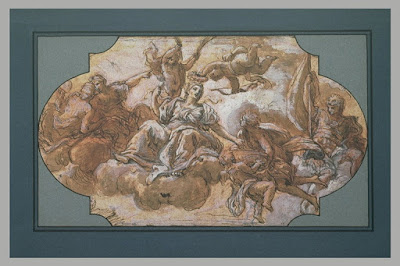 |
| Anthony van Dyck Allegory of Strength defeated by Love before 1641 drawing Musée du Louvre |
 |
| Peter Paul Rubens Peace and War (Minerva protecting Peace from Mars) ca. 1629-30 drawing, with gouache and oil paint Musée du Louvre |
 |
| Giuseppe Passeri Allegorical Scene of Triumph before 1714 drawing (study for ceiling painting) Musée du Louvre |
 |
| Antonio Molinari Time vanquishing Beauty before 1704 drawing Musée du Louvre |
 |
| Paolo de' Matteis The Church triumphant over Falsehood before 1728 drawing Cooper Hewitt, Smithsonian Design Museum |
 |
| Carlo Maratti Painting attacked by Ignorance ca. 1680-82 drawing (study for print) Musée du Louvre |
 |
| attributed to Jacopo Ligozzi Vice disrupting Scholarship ca. 1590 drawing Musée du Louvre |
 |
| Jacopo Ligozzi Triumph of Death before 1626 drawing Musée du Louvre |
 |
| Charles Le Brun Allegorical Figure of Discord ca. 1650 drawing (study for tapestry) Musée du Louvre |
 |
| Charles Le Brun Allegorical Figure of Deception ca. 1650 drawing (study for tapestry) Musée du Louvre |
 |
| Paolo Farinati Allegory of Fortune before 1606 drawing Musée du Louvre |
 |
| Ludovico Carracci Allegory of Poetry consoling Painting ca. 1603 drawing (study for funeral decorations for Agostino Carracci) Musée du Louvre |
 |
| Ludovico Carracci Allegorical Scene of Triumph ca. 1600-1619 drawing Musée du Louvre |
 |
| Bernardino Campi Allegory on the Power of Oratory before 1591 drawing Musée du Louvre |
 |
| Alexandre Cabanel Triumph of Flora (Allegory of Spring) ca. 1869-73 drawing, with watercolor (study for ceiling painting) Musée d'Orsay, Paris |
On Reading The Essayes or Counsels, Civill and Morall
1
So many had nothing; we have orchards
sometimes ill-neighboured, and are driven
to untimely harvest, simply to thwart thieves.
Our galleries may or may not be places
of seasonable resort.
2
Of Buildings and Of Gardens are themselves
exercises in prudence. He that builds
a fair house on an ill site doth commit
himself to prison. The sentences also
rise and fall.
3
There are good whisperers and good magistrates
by a noble collusion that is the style.
Even perjury and simony set forth
at a steady pace and arrive in time
for their host to receive them
4
with due courtesy and writs of attainder.
Of Prophecies is not beyond our scope
nor Of Riches our means. Is this Senecan?
Of the True Greatness of Kingdoms and Estates
is a major piece
5
whereas Suspicion is shortly dealt with.
What would men have? puts a radical question
as does the contest between wit and judgment.
Poverty is ... tedious, and means chiefly
poverty of mind
6
that can accommodate what we would call
amplitude and quickness, which may be barren.
Religion, Matters of State, Great Persons
are to be spared jesting, as is any case
that deserves pity
7
though whether the dispossessed figure at all
is a question unasked at my lord's table.
There is much made of precious ointment
which is a potent magnanimity
that carries poison,
8
in my opinion, having read these things.
Dedications were tricky then; they're not now.
That's well worth an acknowledgement, a breather,
before the tide of dark keeping
sweeps us elsewhere
9
sputtering among the wreckage of late Demos.
So many had, and have, nothing; and Bacon
speaks of privateness and retiring. Consult
Of Judicature: the final book of Moses
is his landmark
10
and a good landmark, even: the mislayer
of a mere stone's to blame. So property
and equity are quits. My parents
never owned a house. It could be said
that was their folly.
11
The poor are bunglers: my people, whom I
nonetheless honor, who bought no landmark
other than their graves. I wish I could keep
Baconian counsel, wish I could keep resentment
out of my voice.
– Geoffrey Hill (2007)